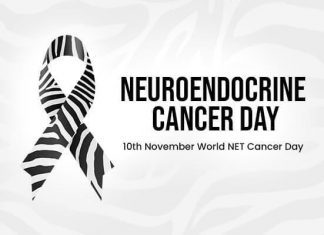NET cancer is an acronym for Neuroendocrine tumor. NET, or NETs, is an umbrella term for a group of unusual, often slow-growing cancers, which arise from neuroendocrine cells found throughout the body. For years this group of cancers was identified as a specific disease called carcinoid. This term is slowly being replaced in medical literature by the term NETs.
NET Cancer is listed with the National Organization of Rare Disorders (NORD). It has received low priority for medical research because of its rarity and lack of public awareness. That’s why we are out there, spreading the word, and doing as much as we can to bring NETs to the forefront.
However, NETs are not as rare as once thought. More than 12,000 new patients are diagnosed each year and as many as 125,000 patients are living in the US today. And the number of diagnoses is increasing by more than 5% annually.
WHERE DO NETs OCCUR ON THE BODY?
The most common sites for NETs to occur are in the digestive system, lung, and pancreas. But they can also occur in many other parts of the body. The place where a NET first appears is called the primary site. However, the NET may spread to other parts of the body such as the lymph nodes, liver, or bones. If this happens your doctor may refer to the NET as a secondary tumor or metastasis.
SYMPTOMS and DIAGNOSING NETs
NETs can have a number of different effects on the body. Some NETs produce abnormally large amounts of hormones and peptides that can cause a related syndrome, such as carcinoid syndrome. This means that the products that are secreted cause noticeable symptoms that vary, depending on the location and biological properties. Oftentimes, the symptoms are similar to other, more common conditions. The most common NET symptoms are abdominal pain, flushing, diarrhea, wheezing, bloating, heart palpitations, edema, skin rash and heartburn.
It’s not unusual for NETs to be overlooked during the diagnostic process. In fact, many patients go untreated for years because they have been told they have another disease with similar symptoms. However, if the tumors are found early and you get proper treatment, you may live a long life.




